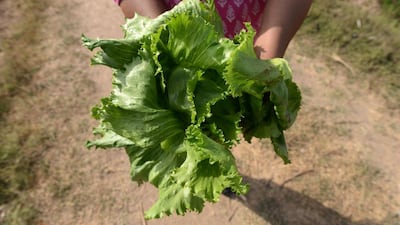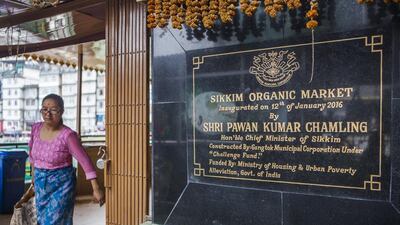MUMBAI // When a new organic food venture launched in Hyderabad 12 years ago, it had a hard time convincing farmers in India to take up organic methods.
They were sceptical about the change, especially given that it takes up to four years for a farm’s soil to become free of pesticides and chemicals.
But the efforts of the company, 24 Mantra Organic, paid off, and today it works with almost 30,000 farmers and its products, ranging from lentils to spices to juices, are sold in more than 1,500 shops in India and overseas.
Organic farming is on the rise in India, with Indians demanding healthier food and the central and state governments increasingly pushing for and supporting organic farming.
There have been instances in which Indian food exports have fallen foul of international standards, which furthers the case for organic farming. Food safety inspectors in the UAE last month found potentially dangerous levels of chemicals and pesticides in some fruit and vegetable exports from India.
“We have seen tremendous growth and momentum in the past five years in the [organic farming] sector,” says N Balasubramanian, the chief executive of 24 Mantra Organic. “The awareness about organic products has increased manifold among the consumer and the demand for organic products has increased tremendously.
“Around 10 years back when we had just started out, people were not very conscious about what they were eating. Affordability of organic products has also increased along with the rise in purchasing power of the people. The organic sector in India is set to grow further.”
He says: “With government support and incentives, the farmers are now willing to try out organic farming, especially since there are many success stories around them.”
One such success story can be found in Kerala, in the south: Bijumon Kurian grows coffee and spices organically in Kottayam in Kerala.
“Organic farming is growing annually and the Indian government is promoting organic farming,” says Mr Kurian, who is also the managing director of Plantrich Agritech, which is an accredited supplier of fair-trade certified and organic food products to the European Union, and also exports to the Middle East.
Mr Kurian is also the president of the Manarcadu Social Service Society, a farmer cooperative in Kerala that supports small- and medium-scale farmers, certified by international organic and fair-trade standards for 12 types of foods including coffee, vanilla, black pepper, pineapple, coconut, nutmeg and ginger.
“There is an awareness among the consumers for the global movement of organic and it will be one of the answers for climate change and chemical farming is polluting the air, soil and water, so there is a trend towards organic farming in India,” he says.
There are more than 100,000 farmers in Kerala practising organic farming and at least 10 cooperatives promoting the sector in the state, he says.
Leading the way is Sikkim in north-east India. Earlier this year, it became the first state in the country to become completely organic. This was achieved after the local government in 2003 declared that Sikkim would become an organic farming state and eventually banned the sale of chemical products for use on farmland.
Mr Balasubramanian says that the north-eastern states in India are where the majority of farmers use organic farming, although the practice is spreading across the country.
“Traditionally these have been heavy rain-fed areas and have been cultivating naturally. But now Karnataka, Maharashtra, and Kerala farmers are taking up organic farming.”
Madhya Pradesh has the biggest area of farmland under organic certification, followed by Himachal Pradesh and then Rajasthan, according to the Agricultural and Processed Food Products Export Development Authority (Apeda), which is part of the Indian government.
It says that India generated about 1.35 million tonnes of certified organic products in the financial year to the end of March this year, including tea, sugar cane, cereals, vegetables and fruit. Of this, 263,687 tonnes was exported.
Apeda’s figures show that US$298 million of organic food was exported in the previous financial year, half of which was made up of oil seeds, followed by processed food products accounting for a quarter of exports and then cereals and millets at 17 per cent, while other goods made up much smaller quantities of exports.
The European Union, United States, Middle East, South Africa, Australia and South East Asian countries are among its export markets.
The central government is taking a number of steps to boost organic farming in India. In February, it launched the National Organic Farming Research Institute in Gangtok in Sikkim.
“The institute will undertake basic, strategic and adaptive research on efficient, economically viable and environmentally sustainable organic farming systems for improving productivity, resource-use efficiencies and quality of produce,” the government said in a statement. “Besides, it will impart vocational and advanced training to stakeholders for promotion of organic farming in the country. Required financial resources, manpower and infrastructure facilities will be made available accordingly.”
In its union budget for the current financial year, the government, led by Narendra Modi, the prime minister, announced plans to allocate 4 billion rupees (Dh218.7m) to organic farming schemes.
“To increase crop yields in rain-fed areas, which account for nearly 55 per cent of the country’s arable land, organic farming is being promoted,” announced Arun Jaitley, the finance minister, when the budget was presented, revealing that the government was launching two schemes to boost organic farming and help producers find domestic and export markets.
“It used to be the higher middle class and the elite who consumed organic earlier,” says Mr Balasubramanian. “But in the last couple of years we have seen a radical shift in consumption. Today even middle-class families in tier 2, tier 3 cities are adopting organic.
“We see a huge demand coming from non-metro cities and expect it to grow in the near future. The demand exists both in domestic as well as foreign markets. Currently as the western countries adopted organic much earlier, the demand is high outside India. However, this is expected to change with the support of government and movements to make states go organic.”
India has suffered two years of poor monsoon rainfall, which has been a significant factor in plunging parts of the country into the worst drought in decades and is linked to exacerbating the problem of high farmer suicide rates.
“Organic farming also increases the water table at the ground level,” says Mr Balasubramanian. “With proper crop rotation, the farm in the long term not only provides equivalent yields but also sustains the water levels and performs better in drought like conditions. The benefits of organic farming are immense for the farmers.”
But there are factors that are holding back the growth of organic farming in India.
Shirish Barwale, the co-chair of the agriculture committee at the Indian Merchants’ Chamber, says that while demand for organic produce has risen in India recently, it is still “niche”, partly because organic produce is more expensive.
“It still covers less than 1 per cent of the total cultivated land in India,” he says. “It’s still not mainstream. Of course, we believe that it’s an important choice that customers should have in the country and hopefully over time more consumers will be able to afford such choices.”
Mr Kurian says organic farming is about 20 per cent more expensive than conventional farming because they need to secure organic alternatives to synthetic pesticides and chemicals.
Mr Barwale explains that “until we are able to figure out a way to grow [organic produce] in a more affordable manner, I don’t expect to see a much larger consumer base for the product itself because it’s significantly more expensive than traditional commodities and the people who can afford to consume it or are aware of the benefits are still relatively limited”.
Organic agriculture often does not use a “very science-based approach to producing food”, which often results in significantly lower output, he says. Developing more scientific techniques for organic farming needs to be worked on in India to increase productivity because this could be “a game changer and where the true potential lies” for the country, he says.
business@thenational.ae
Follow The National's Business section on Twitter



